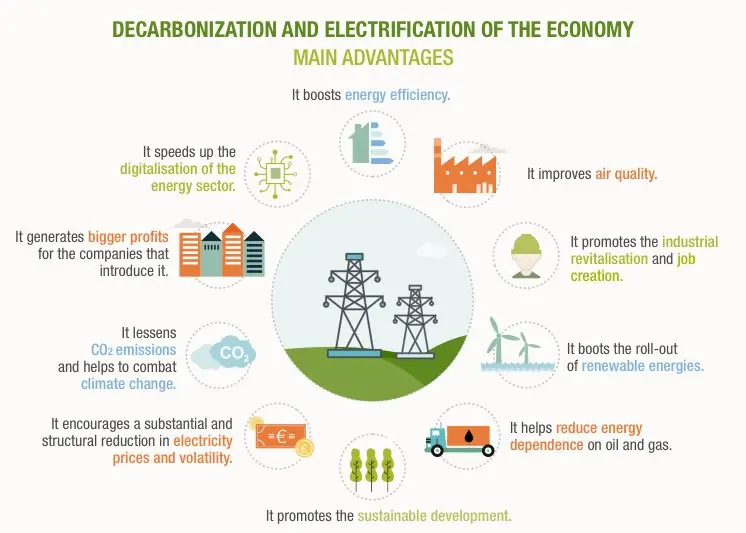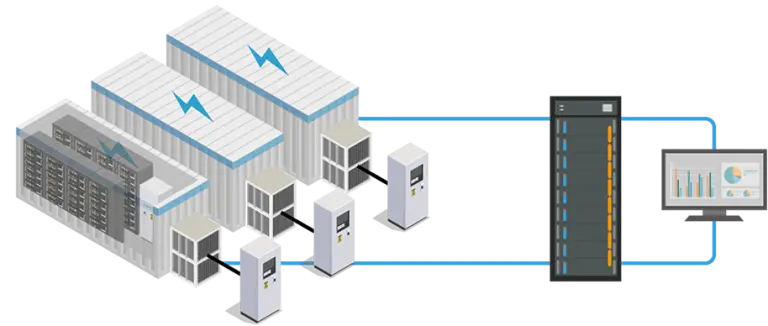Battery Energy Storage Systems

Battery Energy Storage Systems (BESS) Developer
Haak is a developer with the mission to offer battery energy storage solutions (BESS) to C&I, Telecom, Utilities, EV Charging segments.
Haak is committed to decarbonization and electrification of developing economies. Electricity is fundamental to decarbonization through renewable energy.
The company’s business model positions it as a key agent in the transformation of the electricity markets. With its experience, engagement with the corporate consumers, it is advancing distributed generation model for long term sustainability with BESS as a key enabler.
What are Battery Energy Storage
Systems?
The battery energy storage system's (BESS) essential function is to capture the energy from different sources and store it in rechargeable batteries for later use. Often combined with renewable energy sources to accumulate the renewable energy during an off-peak time and then use the energy when needed at peak time.
This helps to reduce costs and establish benefits for the user. BESS has flexibility with grid connection and can be operated in local mode when the grid is not available

Why BESS by Haak:
- Decarbonizing the industry powered by diesel generators are crucial, as they contribute as very high percentage to the global Carbon emission. What better way to contribute to the reduction of your carbon footprint that also benefits your bottom line.
- Save on Fuel Expenses
- Save on O&M Expenses
- Enhance the life of your Diesel Generators
- Control load management and mitigate power fluctuations
- Lower the run-time of the diesel generators
- Add renewable power generation sources (if available) to further reduce genset on-time and save fuel.
- Save Money and Reduce Carbon footprint
- A Win-Win situation for all
- We use non-chemical energy storage modules that support fast and Slow Charge / Discharge thereby giving flexibility to the operations of the BESS System
- Higher life cycle of upto 500,000 at cell level
- Supports upto 4 charge / discharge cycles per day
- 10 years warranty for the BESS system
- Control load management and mitigate power fluctuations
- Optimize energy use while reducing costs and grid stress.
BESS for BTS (Cellular) Towers



Requirements of BESS and Backup in BTS Towers
BTS towers need electricity to operate. In remote areas, these towers are powered by Diesel Generators. It has been seen that DGs operate at much lower loads which makes their operations inefficient thereby prolonged hours of operations, higher fuel and O&M expenses and shorter operational life. BESS systems operate these generators at the max efficiency level and store the excess power generated by the DGs. Once the BESS storage is full, the DGs are shut down and the BESS supplies the electricity. This reduces the cost of fuel and O&M, lowers Carbon footprint and extends the operational life of the DGs. Moreover, Batteries are also installed post rectifiers that act as backup supply incase the generator or grid supply shuts down.






Battery Energy Storage Systems (BESS) store energy from renewable or/and conventional sources while providing reliable power for construction sites. They offer a cleaner, quieter alternative to diesel generators, especially in remote or urban areas with limited grid access. BESS helps manage fluctuating energy demands, reducing operational disruptions and facilitates environmental impact.



Construction Site:
- The system is powered by 3x410KVA gensets;
- Running 4x3 ton cranes, power tools and offices;
- Average 24 hours load is 6% of the genset capacity, with peaks of more than 400kW.
- 24 hours operation;
- 500kW_500kWh BESS System
- BESS system has 10 years warranty
- Can operate at 4 cycles per day
- End of warranty battery capacity – 95% of rated capacity Reduction in Genset time by more than 90%
- Reduction in O&M cost by almost 75%
- Reduction in fuel consumption by more than 70%
- Reduction in estimated carbon emission by 3.6K metric tons per annum
BESS for EV Charging Facilities



The Concept:
The goal of integrating BESS units is to store energy from the renewable sources and the grid and release it to charge electric vehicles when required. When a vehicle is connected to the charger, the BESS unit can provide a stable power source, reducing the risk of power surges and other issues that could damage the vehicle or the charging system. Additionally, BESS units can decrease the charging system’s operational cost by reducing the grid’s peak power demand. By storing energy during off-peak hours and releasing it during peak hours, BESS can reduce the overall power demand from the grid, which can decrease the cost of electricity for the charging system. Countries are accelerating the number of DC EV chargers, making them favorable for incorporating energy storage systems.


Understanding BESS for EV Charging:
Haak storage solutions enable businesses to install multiple charging stations without requiring costly grid upgrades. By utilizing stored energy, BESS provides a Power Boost, ensuring that EVs charge efficiently even when grid supply is constrained. This capability is especially beneficial for fleets and high-traffic charging hubs where multiple vehicles need simultaneous charging. Energy Management System (EMS) enables a power boost through direct integration with EV Chargers, eliminating the need for an external EMS.
Load balancing is another crucial advantage of BESS integration. Instead of drawing high power from the grid all at once, stored energy is distributed evenly across all charging stations, preventing peak loads that can result in excessive demand charges. This not only optimizes energy use but also enhances the reliability of the charging network.
Peak Shaving and Energy Cost Management
Electricity costs can vary significantly throughout the day, with peak demand periods leading to higher rates. By integrating BESS, businesses can practice peak shaving, using stored energy during high-cost periods and recharging batteries during off-peak hours.
Diesel Generator Optimization Solution (BESS) for Office & 3D Printing Facility



Battery Energy Storage Systems (BESS)
Store energy from renewable or conventional sources including Diesel Generators, providing reliable power for business operations. They offer a cleaner, quieter alternative to diesel generators, especially in remote or urban areas with limited grid access. BESS helps manage fluctuating energy demands, reducing operational disruptions and environmental impact.
The system being implemented is an off-grid Diesel Generator Optimization Solution powered by 6 DGs. Due to the location and the nature of business, the system has back-up as well as stand-by generators.


Office and Printing Site:
- The system is powered by 6x 270kW gensets;
- Running a large office as well as 3D printing operations;
- Average 24 hours load is approx. 13% of the genset capacity, with peaks of approx.500kW.
- 24 hours operation;
- 500kW_500kWh BESS System
- BESS system has 10 years warranty
- Can operate at 4 cycles per day
- End of warranty battery capacity – 95% of rated capacity Reduction in Genset time by more than 85%
- Reduction in O&M cost by almost 65%
- Reduction in fuel consumption by more than 65%
- Reduction in estimated carbon emission by 4.6K metric tons per annum

Battery Energy Storage System BESS to Facilitate Peak Shaving

What is Peak Shaving:
Peak shaving is the process of reducing the amount of energy drawn from the grid during periods of high electricity demand (peak hours). This helps:
- Lower electricity costs (by avoiding peak demand charges).
- Reduce grid congestion and strain on infrastructure.
- Improve energy efficiency and sustainability.
Benefits of BESS for Peak Shaving:
- Charge During Low Demand
- Discharge During Peak Demand
- Lower Demand Charges
- Grid Support
Key Benefits:
- Cost Savings – Reduces demand charges and takes advantage of time-of-use (TOU) rates.
- Energy Independence – Less reliance on the grid during expensive peak hours.
- Smoother Power Usage – Avoids sudden demand spikes.
- Better Integration with Renewables – Can store solar/wind energy for use when needed.


Hotel Kitchen with Load Issues:
- Average 24 hour load is 100kW
- Maximum load of the kitchen is 200kW.
- Load approved by electricity provider is 125kW. The BESS is charged when the usage is below 125kW and utilized when the load exceeds above 125kW.
- The grid provides the power upto 12kW and anything in excess is provided by the BESS.
- We BESS size here is 300kW_300kWh
- The BESS helps maintain the operation of the kitchen without exceeding the approved load of 125kW thereby stabilizing the grid.
- If in the future, the establishment decides to add Solar Panels, the BESS can also be charged by these Solar PVs, thereby reducing the cost of power.


Battery Energy Storage System (BESS)
Stores energy from renewable and/or conventional sources and provides reliable power at a later time, when needed, for industries like Recycling. They compliment diesel generators with a cleaner and quieter alternative, especially in remote or urban areas with limited grid access. BESS helps manage fluctuating energy demands, reducing operational disruptions and facilitates environmental impact. Our client is a Plastic recycling unit near Riyadh, Saudi Arabia which is 100% powered by Diesel Generators. Our solution will save them money, reduce the run-time of the generators and enhance the operational efficiency of their unit.

Sustainability in the Recycling Sector through Battery Energy Storage System (BESS) by Haak Solutions


Recycling Plant:
- The system is powered by 120kW gensets which operates for 22 hours;
- This powers 2 conveyor belts and 2 motors;
- Average 22 hours load is 40% of the genset capacity.
- The BESS needs to facilitate the operating to 24 hours plus maintaining power stability;
- 120kW_120kWh BESS System
- BESS system has 10 years warranty
- Can operate at 4 cycles per day
- End of warranty battery capacity – 95% of rated capacity Reduction in Genset time by more than 50%
- Enhancement in work shift hours from 22 to 24
- Reduction in O&M cost by almost 40%

Battery Energy Storage System BESS for Diesel Generator Powered RTG Cranes

RTG Cranes and benefits of BESS for these Cranes:
Rubber Tyred Gantry (RTG) cranes are widely used in ports and container terminals for stacking and moving containers. Traditionally, RTG cranes are powered by diesel generators, leading to high fuel costs, emissions, and maintenance. Battery Energy Storage Systems (BESS) offer a cleaner, more efficient alternative by replacing or supplementing diesel power with advanced battery technologies.
Benefits of BESS for RTG Cranes
- Fuel Savings – BESS reduces the runtime of diesel generators by supplying stored energy during peak demand, leading to lower fuel consumption.
- Emission Reduction – By reducing diesel use, BESS helps cut CO₂ and NOx emissions, supporting green port initiatives.
- Cost Savings – Lower fuel consumption and maintenance costs lead to significant operational savings.
- Improved Efficiency – The system optimally manages energy, reducing idling and improving overall crane performance.
- Regenerative Energy Capture – Some BESS systems store energy recovered from braking or lowering containers, improving efficiency further.



Rubber Tyres Gantry Cranes:
The systems are powered typically by 150 to 500kVA diesel gensets depending upon the size of the cranes;
The power requirement depends upon the following;
- Hoisting
- Trolley / Gantry movement
- Short term overload
Duty cycles are dependent upon the locations like:
- High activity at Port terminals;
- Low activity at yards
Time of day power requirements:
- At ports: When loading/offloading containers from the ships and loading/offloading containers from the trucks
BESS for Tariff / Energy Arbitrage

Understanding BESS for Energy Arbitrage:
BESS are essential in energy arbitrage, enabling utilities and market participants to optimize energy use and enhance grid stability. In the context of battery storage, BESS energy arbitrage involves strategically charging batteries when prices are low and discharging them during peak periods when prices are higher. This approach allows utilities to balance grid demand without engaging in speculative trading, focusing instead on efficiency and operational stability.
How BESS energy arbitrage enhances grid efficiency and stability:
- Grid stability: By storing surplus energy generated during off-peak hours, BESS supports grid reliability, helping smooth out fluctuations from intermittent renewable sources like solar and wind.
- Cost optimization: With effective management, BESS can significantly reduce costs by minimizing reliance on high-cost energy during peak periods, enhancing the efficiency of energy usage while saving money.
- Sustainable energy management: BESS energy arbitrage helps integrate renewable energy sources into the grid, reducing dependence on fossil fuels and minimizing environmental impact by optimizing the timing of energy use.

What is Tariff / Energy Arbitrage:
Tariff / Energy arbitrage is the practice of buying electricity when prices are low (often during off-peak hours) and selling it when prices are high (typically during peak demand periods). Energy arbitrage battery storage strategies involve optimizing the charge and discharge cycles of a BESS to maximize profits by taking advantage of price differentials in electricity markets.
Energy arbitrage typically occurs in wholesale electricity markets, and profits are calculated by subtracting the cost of purchasing and storing the electricity (including storage losses and operational costs) from the revenue obtained from selling the electricity at higher prices.
